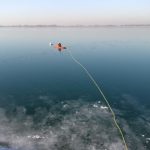Many say that those who take unnecessary risks should be charged for expensive rescue services.
If you fall during a skiing trip in Austria, medical treatment and helicopter transport might cost you two to three thousand euros or more. But if you break your leg or get lost on a mountain in Croatia, as it happened last weekend with two hikers on the Mosor Mountain, you will receive help from rescue services, including a search party and a helicopter, completely free of charge. Of course, these services have their cost, but it is not paid by anyone in particular, since all costs are covered from the state budget, which means that in the end the taxpayers pay all the bills, reports Večernji List on January 17, 2017.
For many, this is illogical, incomprehensible and even irritating. Why would everybody have to pay for rescuing those who knowingly expose themselves to increased risks?
“Search and rescue operations on land and at sea are usually free of charge everywhere. However, when it comes to negligence or when someone deliberately exposes themselves to increased risk – like skiers, hikers, divers…, then it is natural that people have to participate in paying the costs of their own security, either by insurance or by paying services which in other European countries have their price. We need to create the necessary regulations and define the entity that would charge for such services. That is certainly not the Croatian Mountain Rescue Service (HGSS). We can only help for some of the costs, especially for helicopter rescue operations, to be covered from the insurance market. We have discussed the issue with a number of ministers in previous governments and they did accept our arguments, but nothing happened”, said Vinko Prizmić, head of the Croatian Mountain Rescue Service, which these days has its hands full due to low temperatures.
“We have had many cases of hypothermia, and even deaths, especially in Slavonia, Karlovac County and Krapina-Zagorje County. Unfortunately, in some cases we have received calls for help after the person would have been missing for three to four days. Although the media often writes stories about Czech tourists who go to mountains in their flip-flops or about Poles who go to the high seas in small inflatable boats, 80 percent of cases involve Croatian citizens and searches for the elderly or people suffering from dementia, children or someone who has decided to take their own life”, said Prizmić.
Individual search and rescue operations cost tens of thousands of kuna, and when risk-takers and their insurance companies would be billed, the effect would be twofold. Some might decide not to take the risk in the first place.
“There are two ways to resolve the issue of the provision of transport services, which is the largest item in rescue costs. It can be done by a business entity or the service can be provided by a non-profit organization such as the Croatian Auto Club (HAK) or HGSS. The state just has to say which model it wants. Croatian Mountain Rescue Service can be ready within a month”, concluded Prizmić.








